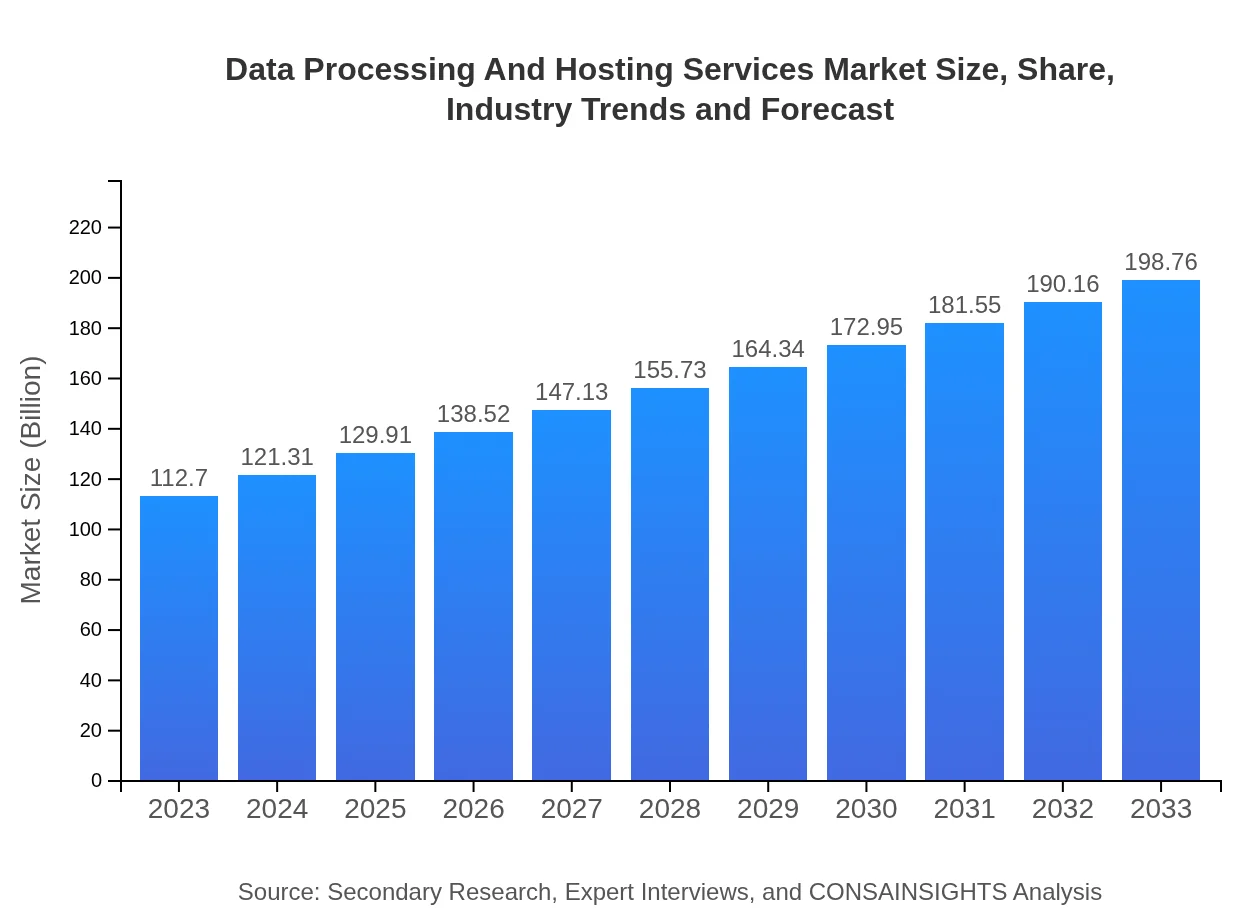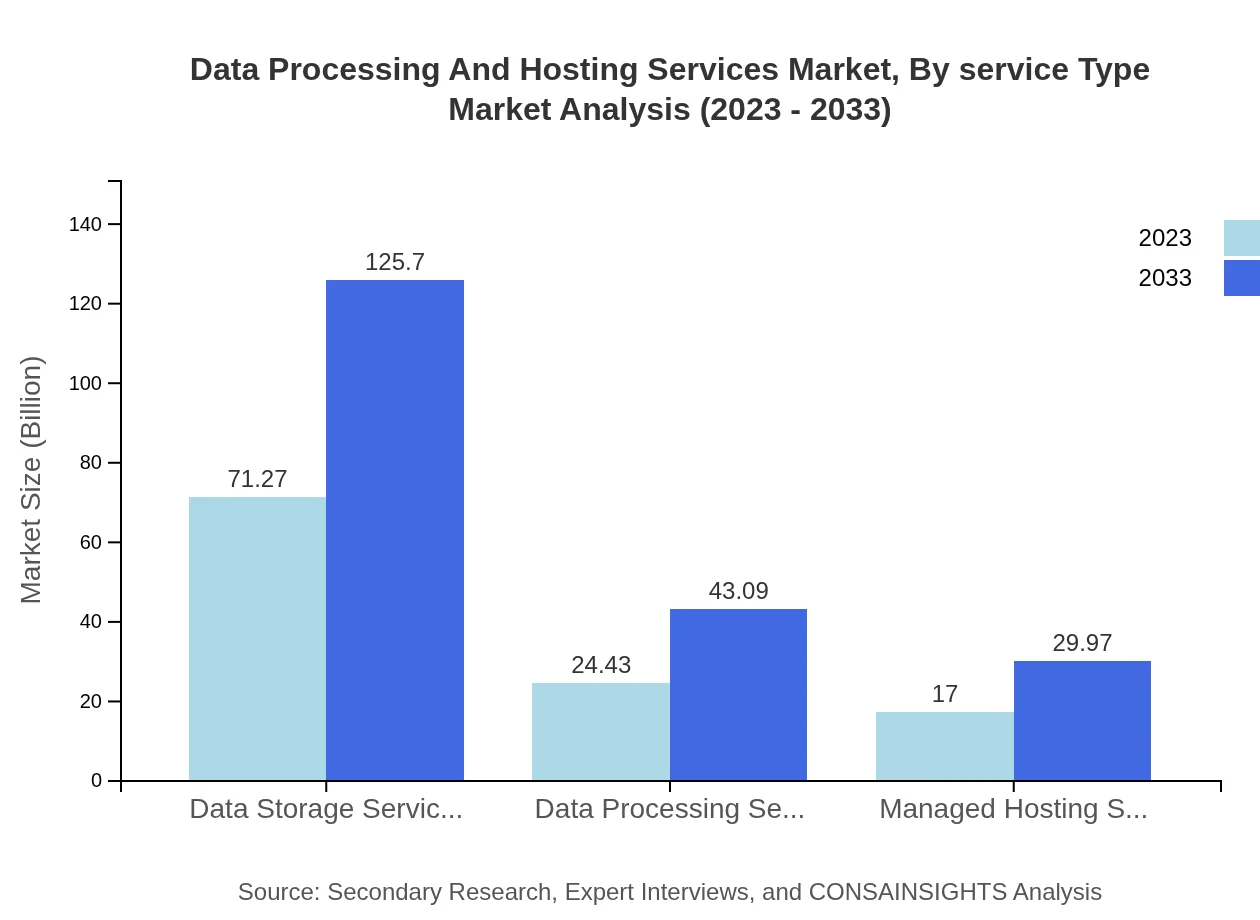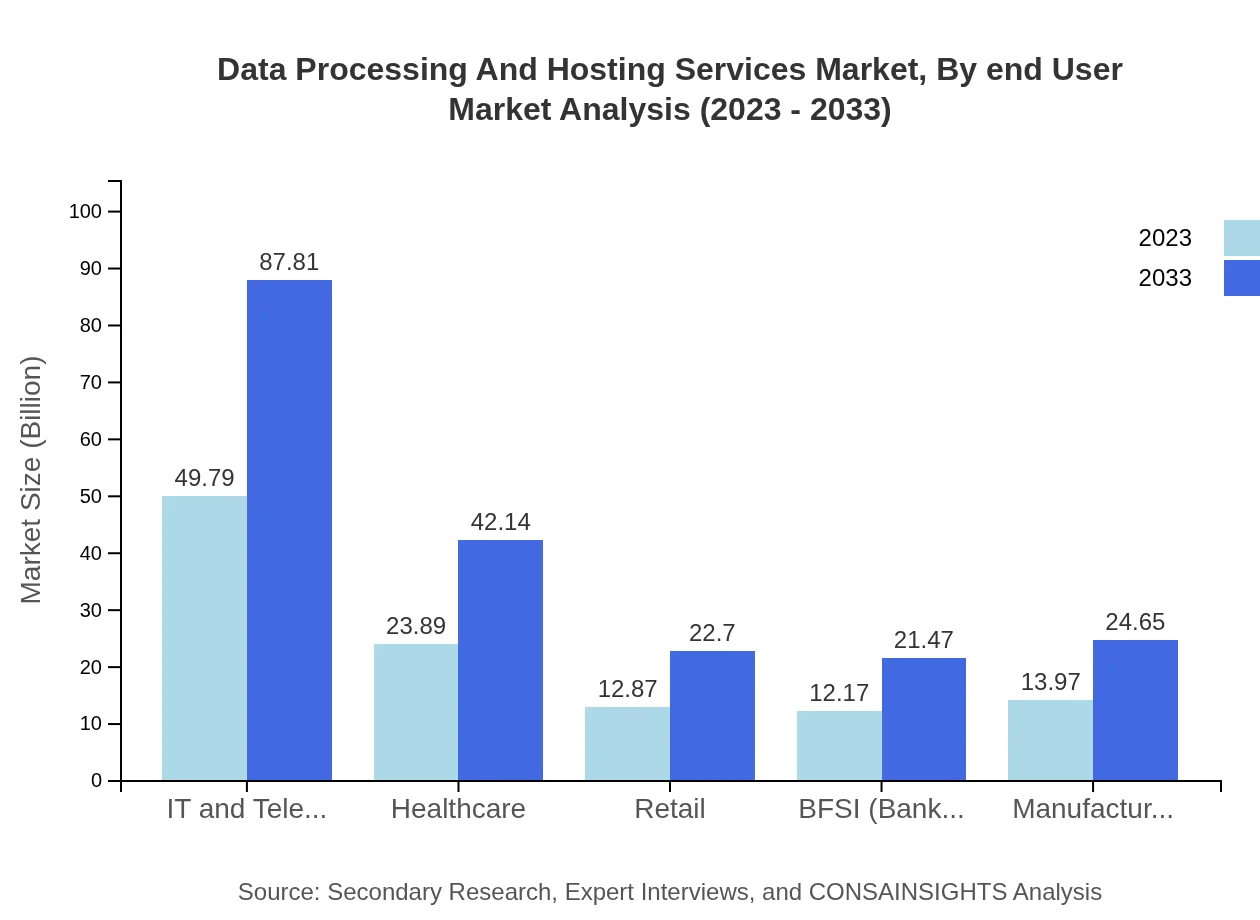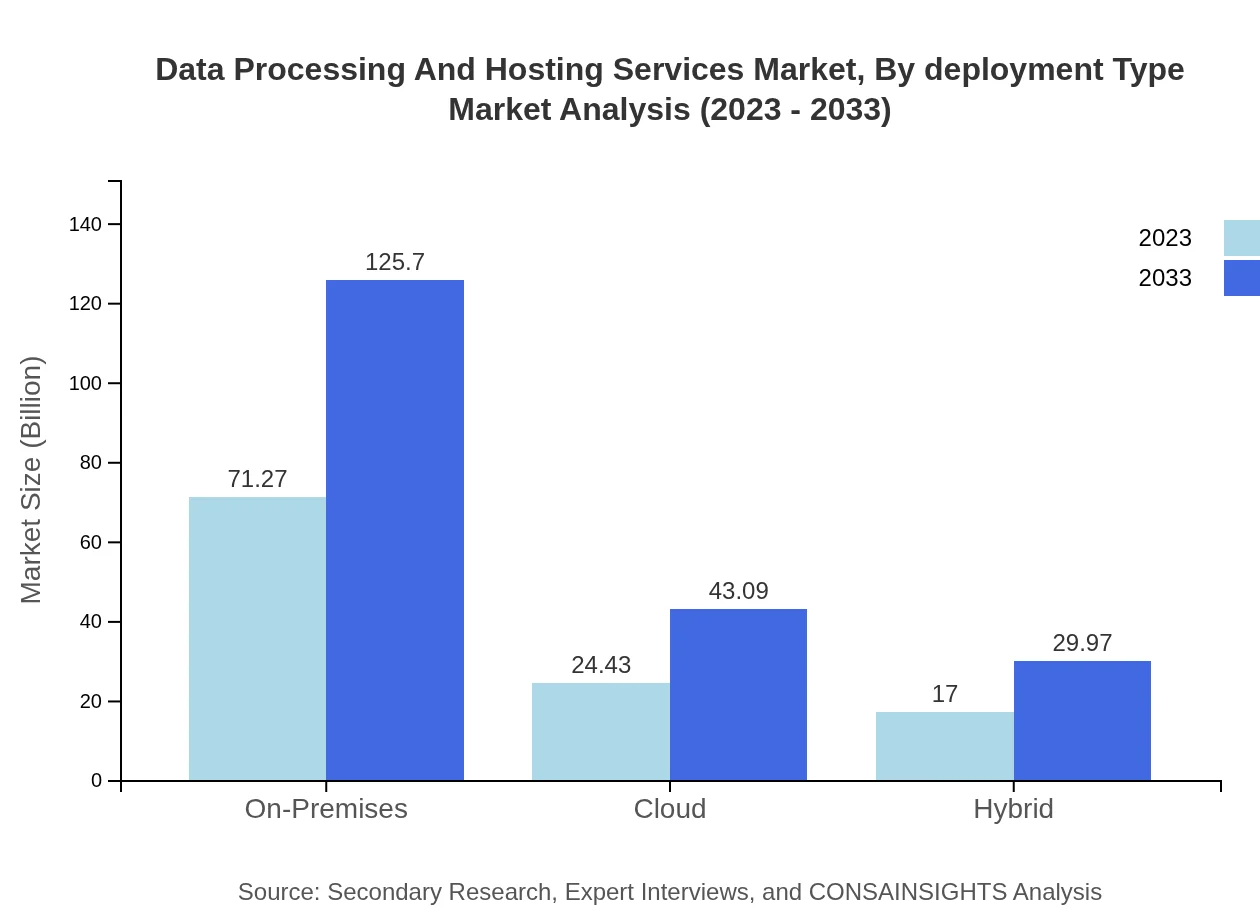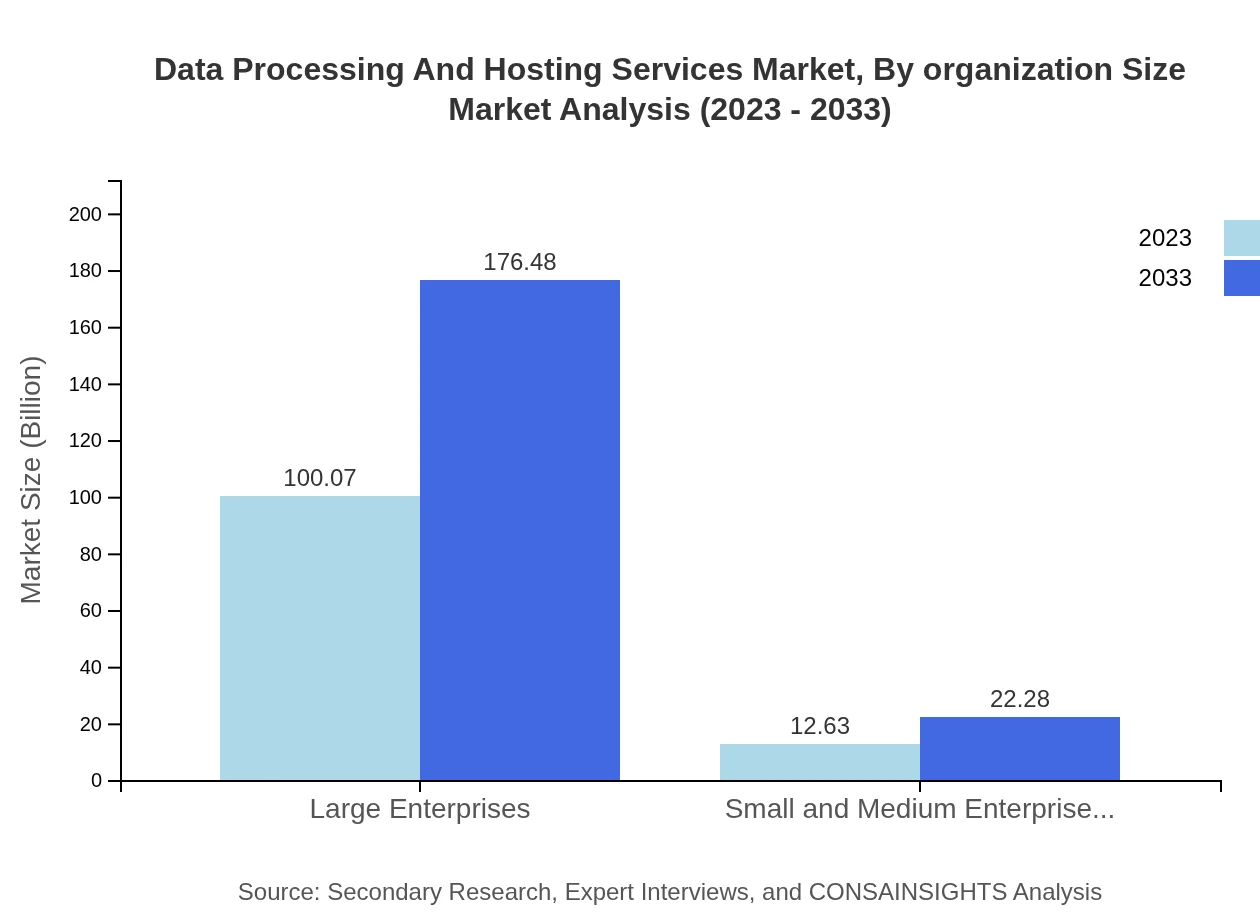Data Processing And Hosting Services Market Report
Published Date: 31 January 2026 | Report Code: data-processing-and-hosting-services
Data Processing And Hosting Services Market Size, Share, Industry Trends and Forecast to 2033
This report provides an insightful analysis of the Data Processing and Hosting Services market, including current trends, regional insights, market size predictions, and forecasts for 2023 to 2033. It covers essential aspects of the industry and serves as a valuable resource for stakeholders.
| Metric | Value |
|---|---|
| Study Period | 2023 - 2033 |
| 2023 Market Size | $112.70 Billion |
| CAGR (2023-2033) | 5.7% |
| 2033 Market Size | $198.76 Billion |
| Top Companies | Amazon Web Services (AWS), Microsoft Azure, Google Cloud Platform, IBM Cloud Services, Alibaba Cloud |
| Last Modified Date | 31 January 2026 |
Data Processing And Hosting Services Market Overview
Customize Data Processing And Hosting Services Market Report market research report
- ✔ Get in-depth analysis of Data Processing And Hosting Services market size, growth, and forecasts.
- ✔ Understand Data Processing And Hosting Services's regional dynamics and industry-specific trends.
- ✔ Identify potential applications, end-user demand, and growth segments in Data Processing And Hosting Services
What is the Market Size & CAGR of Data Processing And Hosting Services market in 2023?
Data Processing And Hosting Services Industry Analysis
Data Processing And Hosting Services Market Segmentation and Scope
Tell us your focus area and get a customized research report.
Data Processing And Hosting Services Market Analysis Report by Region
Europe Data Processing And Hosting Services Market Report:
Europe's market size was $37.60 billion in 2023 and is expected to reach $66.31 billion by 2033. The European market is characterized by stringent regulations around data security and privacy, driving demand for compliant hosting and processing solutions amidst rising consumer protection concerns.Asia Pacific Data Processing And Hosting Services Market Report:
In Asia-Pacific, the market was valued at approximately $17.38 billion in 2023, expected to grow to $30.65 billion by 2033. The region is experiencing substantial growth due to rapid urbanization, increased adoption of cloud services, and the digitization of various sectors, particularly finance and healthcare.North America Data Processing And Hosting Services Market Report:
North America remains one of the largest markets, with a valuation of $40.96 billion in 2023, forecasted to reach $72.23 billion by 2033. A significant proportion of the growth in North America is driven by advanced technological initiatives, increased data generation, and a focus on cybersecurity.South America Data Processing And Hosting Services Market Report:
The South America region is projected to expand from $9.05 billion in 2023 to $15.96 billion by 2033. Growth is attributed to a rising number of startups and technological investments that are enhancing regional digital infrastructures, thereby increasing the demand for data processing and hosting services.Middle East & Africa Data Processing And Hosting Services Market Report:
In the Middle East and Africa, the market size is projected to grow from $7.72 billion in 2023 to $13.62 billion by 2033. Increased investments in technology and infrastructure development, especially across Gulf Cooperation Council (GCC) countries, are contributing to this growth.Tell us your focus area and get a customized research report.
Data Processing And Hosting Services Market Analysis By Service Type
In 2023, the Data Processing Services segment holds a significant market share of approximately $24.43 billion, projected to grow to $43.09 billion by 2033. The Data Storage Services segment, dominating at $71.27 billion in 2023, is anticipated to reach $125.70 billion by 2033. Managed Hosting Services will expand from $17.00 billion in 2023 to around $29.97 billion by 2033.
Data Processing And Hosting Services Market Analysis By End User
Key end-user segments include IT and Telecom, Healthcare, and BFSI. The IT and Telecom sector is projected to reach $49.79 billion by 2033, from $27.58 billion in 2023, capturing a sizeable 44.18% share. Healthcare is expected to grow from $23.89 billion in 2023 to $42.14 billion by 2033, witnessing a market share of 21.2%.
Data Processing And Hosting Services Market Analysis By Deployment Type
Deployment types showcase increasing preferences toward cloud solutions, projected to rise from $24.43 billion in 2023 to $43.09 billion by 2033. On-premises solutions, while still holding a dominant share at $71.27 billion in 2023, are predicted to grow as businesses continue to balance cloud-based functionality and traditional infrastructure needs.
Data Processing And Hosting Services Market Analysis By Organization Size
Large enterprises constitute a significant portion of the market, expected to grow from $100.07 billion in 2023 to $176.48 billion by 2033. Small and Medium Enterprises (SMEs) are also crucial, forecasted to increase from $12.63 billion in 2023 to $22.28 billion by 2033, indicating a growing reliance on data solutions by SMEs.
Data Processing And Hosting Services Market Trends and Future Forecast
Tell us your focus area and get a customized research report.
Global Market Leaders and Top Companies in Data Processing And Hosting Services Industry
Amazon Web Services (AWS):
AWS is a subsidiary of Amazon providing on-demand cloud computing platforms and APIs to individuals, companies, and governments. Its services help organizations effectively manage their IT infrastructures and processing requirements.Microsoft Azure:
Azure is Microsoft's cloud computing service, offering a range of services including cloud storage, analytics, and networking, tailored for businesses of all sizes to enhance their operational efficiency and data management capabilities.Google Cloud Platform:
Google Cloud is a suite of cloud computing services that runs on the same infrastructure that Google uses internally for its end-user products. This platform can be leveraged for data storage, data processing, and operational solutions for various industries.IBM Cloud Services:
IBM Cloud provides a comprehensive cloud platform with various services including hosting and data processing capabilities designed for enterprises looking to streamline their operations and enhance security.Alibaba Cloud:
Alibaba Cloud is a cloud computing service provider under Alibaba Group, offering a suite of international cloud computing services that help businesses increase their technology and operational capabilities.We're grateful to work with incredible clients.









FAQs
What is the market size of data Processing And Hosting Services?
The data processing and hosting services market is valued at approximately $112.7 billion in 2023, with a projected CAGR of 5.7%. This growth reflects increasing demand for data management solutions across various industries.
What are the key market players or companies in the data Processing And Hosting Services industry?
Key players in this industry include Amazon Web Services, Microsoft Azure, Google Cloud, IBM, and Alibaba Cloud. These companies dominate the market with their extensive range of services and innovative data solutions.
What are the primary factors driving the growth in the data Processing And Hosting Services industry?
The growth of this industry is driven by factors such as the increasing volume of data generated, the rising demand for data storage, and the adoption of cloud computing technologies across various sectors.
Which region is the fastest Growing in the data Processing And Hosting Services?
North America is currently the fastest-growing region in this market, with projected growth from $40.96 billion in 2023 to $72.23 billion in 2033. Europe and Asia-Pacific also show substantial growth potential.
Does ConsaInsights provide customized market report data for the data Processing And Hosting Services industry?
Yes, ConsaInsights offers customized market report data tailored to specific needs within the data processing and hosting services industry, ensuring clients receive relevant insights.
What deliverables can I expect from this data Processing And Hosting Services market research project?
Expect detailed market analysis, competitive landscape reports, regional data, and trend analysis. Deliverables will include comprehensive charts, forecasts, and segmentation data essential for strategic decision-making.
What are the market trends of data Processing And Hosting Services?
Current trends include a shift towards cloud-based services, increased investment in data security, and the rise of artificial intelligence integration. This reflects the need for efficient, scalable, and secure data solutions.

